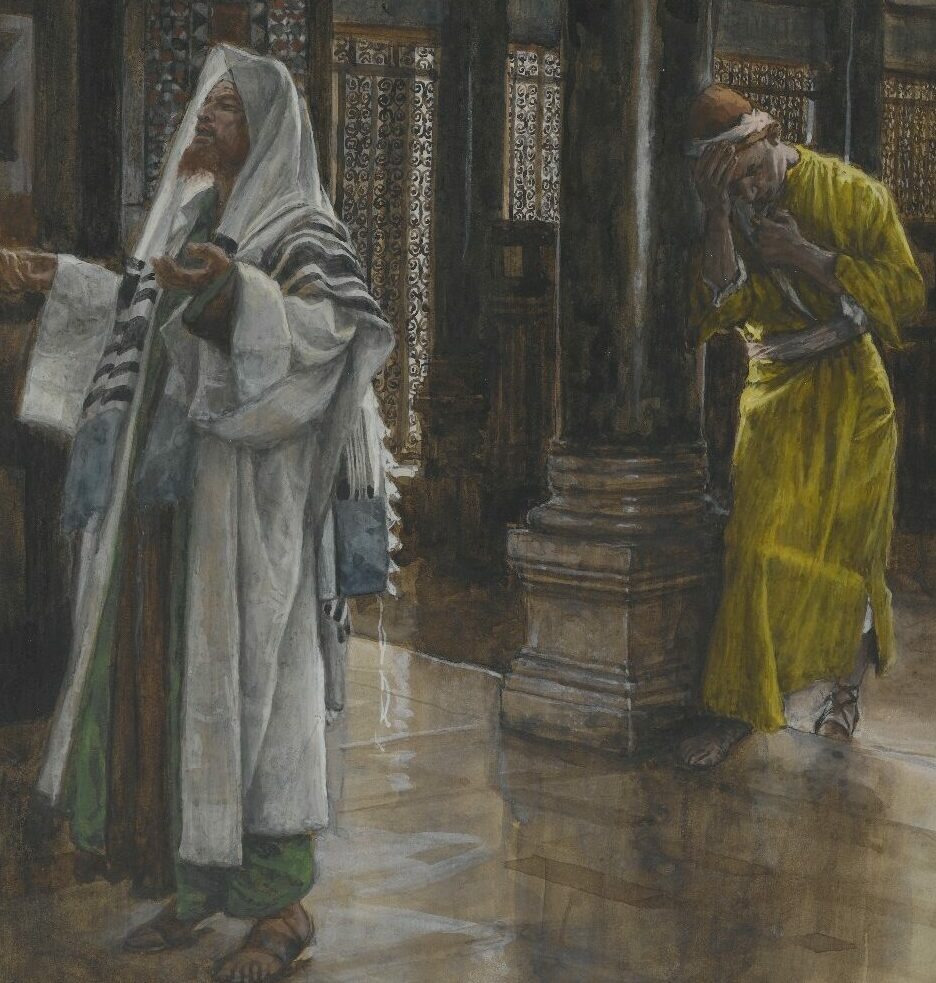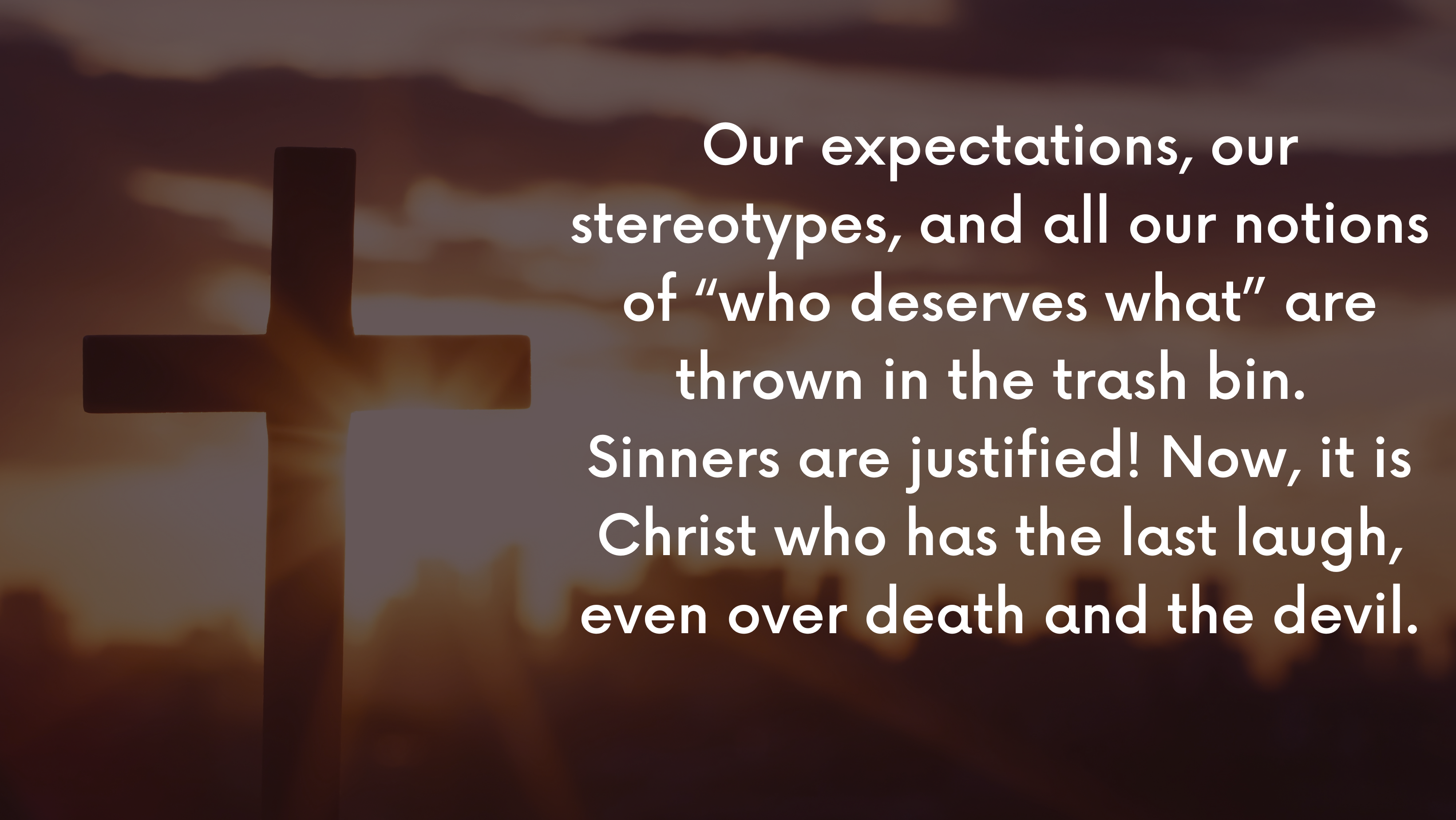Twentieth Sunday after Pentecost
A Pharisee, Jesus, and a Tax Collector Walk into a Bar
Luke 18:9-14
20th Sunday after Pentecost
Analysis by Glenn L. Monson
9 He also told this parable to some who trusted in themselves that they were righteous and regarded others with contempt: 10 “Two men went up to the temple to pray, one a Pharisee and the other a tax collector. 11 The Pharisee, standing by himself, was praying thus, ‘God, I thank you that I am not like other people: thieves, rogues, adulterers, or even like this tax collector. 12 I fast twice a week; I give a tenth of all my income.’ 13 But the tax collector, standing far off, would not even lift up his eyes to heaven but was beating his breast and saying, ‘God, be merciful to me, a sinner!’ 14 I tell you, this man went down to his home justified rather than the other, for all who exalt themselves will be humbled, but all who humble themselves will be exalted.”

James Tissot (French, 1836-1902). The Pharisee and the Publican (Le pharisien et le publicain), 1886-1894, cropped. Opaque watercolor over graphite on gray wove paper, Image: 9 7/8 x 6 1/2 in. (25.1 x 16.5 cm). Brooklyn Museum, Purchased by public subscription, 00.159.178 (Photo: Brooklyn Museum, 00.159.178_PS2.jpg)
Our expectations, our stereotypes, and all our notions of “who deserves what” are thrown in the trash bin. Sinners are justified! Now, it is Christ who has the last laugh, even over death and the devil.
DIAGNOSIS: The Set-up
Step 1: Initial Diagnosis (External Problem): We’ve Heard This One Before
We have all heard the opening line, “A preacher, a priest, and a rabbi walk into a bar.” When we hear this we know that we are dealing with stereotypes – all purportedly righteous sorts – and we are being set up. So here, “A Pharisee and a tax collector enter the temple to pray.” We know immediately that we are dealing with a righteous person and an unrighteous person. We know who is who. At least we think we do.
Step 2: Advanced Diagnosis (Internal Problem): Taking it Hook, Line, and Sinker
Sure enough, the characters perform as expected: The Pharisee announces his righteousness and the tax collector stands far off, beating his breast, crying for mercy. We think, “Just as we thought. The sinner is in his rightful place, and the righteous one is in his. What could be more fitting?” Nothing to look at here.
Step 3: Final Diagnosis (Eternal Problem): Punch Line!
“I tell you [the sinner] went home justified, rather than [the righteous one].” Wow! We didn’t see that coming. All this time we had been believing that thieves and rogues, adulterers and other sinners were beyond grace, when, in fact, it is the self-righteous that stand distant from grace. What a punch line! What a reversal! What an end to our self-righteousness!
PROGNOSIS: The Punch Line
Step 4: Initial Prognosis (Eternal Solution): Christ Has the Last Laugh
The One who humbled himself, “and became obedient to the point of death – even death on a cross,” is the One who is exalted, leading the way to the exaltation of all those who humble themselves before this Lord. Our expectations, our stereotypes, and all our notions of “who deserves what” are thrown in the trash bin. Sinners are justified! Now, it is Christ who has the last laugh, even over death and the devil.
Step 5: Advanced Prognosis (Internal Solution): We’ve Been Taken in by Christ
Our expectations have been reversed. We no longer trust in our own righteousness – our tithing, our fasting, our piety, our ability to live up to ‘righteous’ expectations – but we trust in the Merciful One, who alone saves. We are continually surprised by the grace extended even to us.
Step 6: Final Prognosis (External Solution): We Love Telling This Story
We tell this hilarious story wherever we go: “A thief, a rogue, an adulterer, and a tax collector went before the bar of the Almighty.” What happened? They were justified by grace, by the Merciful One who always has the last laugh. Alleluia! The heavens shake with the laughter of God.
